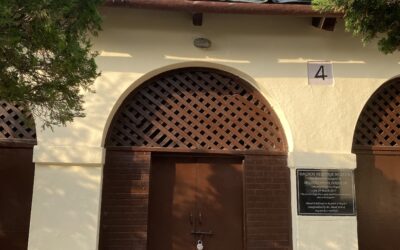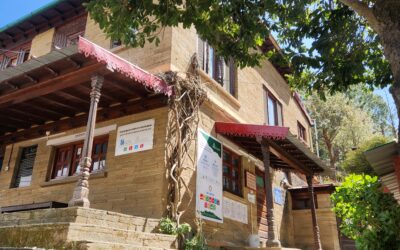My father being in the Army gave us a chance to move to a different city every 3-4 years. Shifting to a new place meant a new school and new friends but the best memories I have from studying in Army Schools came from the emphasis on Physical Activity and Sports. When I was in school, I remember trying my hands on all games. It was imbibed in us since childhood, which helped us learn a lot of skills and values.
I can easily call myself a city girl, as until I completed my post-graduation, I had never visited even one village. Fortunately, after joining India Fellow, I started working in a government school at Bhoola, a remote tribal village in Rajasthan. After just a month of spending time with children here, I realized that there was no emphasis on sports and physical activity in the regular curriculum of the school, and hence not enough inclusion.

Initially, I thought of playing with them after school, but children said that they have to help their parents with household chores and at fields after school, which is why they can’t stay back. Then I decided that I’ll come on weekends to spend time with them at school and play different sports, make some art, practice music, and dance. Weekends became fun and at the same time, they made me nostalgic about my school days. When I saw them playing during breaks, I introduced them to Kho-Kho and Volleyball.


As the time passed, children here started showing an unimaginable level of stamina as well as potential to learn and explore new things. What we lacked was the availability of resources, support, and exposure to the outer world.
Last year in September, a District level Sports Tournament was organized where children from different schools participated. It had just been two weeks since I joined and hence, I was not aware of the tournament in advance. It was amazing to see that a boys team from our school was going to the tournament for Kabbadi.
On asking teachers if we could take girls as well for the tournament, they said the girls won’t be safe and that their parents will not allow. Plus, what’s the use if they won’t be continuing the activities later, they remarked. It sounded like taking a big risk. On the other hand, when I asked girls if they would want to play, they said they wish to be outside and try different games, but no one allows them.
At that moment, I really wanted to stand up and speak for these girls, but I calmed myself down thinking that I neither have the required knowledge nor that level of relationship or authority in the school and community to make a valid point. With a silent promise to myself, I started spending more time with children in school on weekends. Playing Kho-Kho became a routine. The boys and girls who didn’t even sit together in the class had started playing together.
On Republic Day, as I was helping children prepare for the performance, the Physical Education Teacher of the school informed about the upcoming Sports Tournament organized specially for Scheduled Tribes by Rajasthan Government. I requested him to talk to the Headmaster regarding this and take his permission for both girls’ and boys’ teams playing in the tournament. He denied that due to his personal dispute with the Headmaster but agreed to support me in the plan.
To take a stand for girls, I went to the Headmaster’s office and briefed him about the tournament. As usual, he didn’t agree and gave me a number of excuses explaining why he can not get a written permission from higher authority to sanction the budget for uniforms and travel. I took charge to get all that done for which I went to the Principal of Rohida School, who was the temporary authority to grant an order for our school.
During the Parents-Teacher Meeting, I met with parents of each child and had a conversation with them regarding the tournament. To my surprise, they were really supportive and glad that their kids are getting a chance to participate in such an event. This entirely contradicted to what teachers had told me earlier.
After a long struggle, we got permission as well as money for the tournament. From wearing boys’ uniforms for their first block level match at the tournament to having their own uniform for finals, the journey was indeed a roller coaster ride. When I told my girls about getting all permissions, they danced in excitement.

At Kojra – Block Level Tournament


At Sirohi Pavilion, District Level
The girls who had played for the first time at Block level tournament in Kojra, stood first in Kho-Kho. Seeing my enthusiasm on the ground, I was felicitated by the sports authority with a Chief Guest Memento. After this, the team represented Pindwada Block at Sirohi Pavilion, for District Level tournament. They won at District Level as well and were selected to represent Sirohi District at State Level. The team stood 4th over there, but all the girls who were selected for State Level game, are now being given a pension of Rs 500 every month. Two of them have even been selected for the National level tournament. It has been an overwhelming experience not just for the students but for the whole village.
Teachers were surprised to see the performance of girls and agreed to support them wholeheartedly in sports from now on. These days, one can see little kids running around and playing Kho-Kho as and when they get time. Ramila* from 5th grade says, “I want to go for the tournament next time”.

We have a long history of women participating in sports. It is a history marked by division and discrimination but also one filled with major accomplishments which led to important advances in gender equality and empowerment of women and girls.
Female participation in sports challenges gender stereotypes and bias and is, therefore, a vehicle to promote equality. Women in sports leadership can shape attitude towards their capabilities as leaders and decision-makers, especially since sports is traditionally considered to be a male domain.
*Names changed to protect the identity




Congratulations …..
Thank you. 🙂